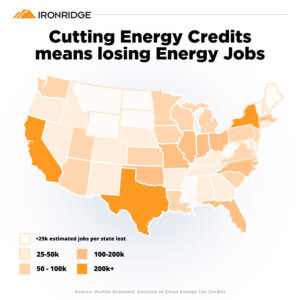The Investment Tax Credit (ITC) for residential solar was first introduced in 2005 under Section 25D of the Energy Policy Act of 2005. Since that introduction, the ITC has been modified and extended several times. Most recently, the Inflation Reduction Act (2022) restored the 30% credit for PV systems installed from 2022 through 2032. Currently, the credit will step down to 26% in 2033 and 22% in 2034. The House Ways and Means Committee has proposed a budget plan that would end the Residential Clean Energy Credit (Section 25D) by December 31, 2025, thus terminating the credit nearly a decade ahead of its previously scheduled expiration. This is an existential threat to a thriving industry that employees hundreds of thousands of Americans. Some key points for consideration:
-
Cut 292,000 American Jobs. Residential Solar supports jobs, particularly blue collar jobs in the areas of installation and project development.
-
Erase $220 billion in local investment. Solar Contractors are, by-and-large, local small businesses, found in every State in the country.
-
Close or Cancel 287 Amercian Factories for solar and storage. Less US manufacturing results in less US jobs.
-
Elimination of 145 TWh of electricity generation by 2030. Residential Solar is needed to meet the energy demands of our modern world.
-
Residential Solar offers stable energy prices, mitigating the effects of Inflation for working Americans.
-
Solar plus storage creates independence and resiliency.

Residential solar is a job creator. It supports over 280,000 jobs in our communities. Of those close to 300,00 jobs, 64% are blue collar jobs in installation and project development. Elimination of Section 25D would result in the elimination of an estimated 50,000-75,000 jobs. A 2025 study by the Brattle Group, and referenced by SEIA, estimates approximately 3.8 million job-years lost throughout the economy through 2035 through the elimination of Clean Energy Credits.
Solar supports a renewed focus on products made in the USA. The entire solar supply chain, from modules, to inverters, to racking, support domestic manufacturing. IronRidge has pivoted supply chains to support domestic demand. A robust residential rooftop solar sector is vital to continue this demand for domestically produced products.
Residential Solar is a hedge against inflation. Reducing cost and locking in electrical rates through solar is a direct benefit to the homeowner. Additional cash flow allows households to spend their energy savings in their community, supporting other local businesses. By generating power where it’s needed, residential solar reduces cost of infrastructure, generating savings across the community.
Close to 30% of residential solar systems included energy storage in 2024. Events over the last several years have highlighted the benefit of these solutions to the individual homeowner, as well as their broader community. The effects of power outages can be devastating. Fostering the adoption of solar plus storage creates a more resilient community.
The energy demands of the modern world are immense. Solar has proven to be an effective approach to add power to the grid quickly and efficiently. Solar has made, and can continue to make, massive contributions to meet the growing electricity demand from new homes, manufacturing facilities, data centers, and military bases.
Jobs, domestic manufacturing, direct benefits to cash-strapped Americans and their local community, resiliency, independence, energy security – all enhanced through access to residential solar. Elimination of 25D negatively impacts each of these. Let your legislators know you care, you’re watching, and you vote.
Additional Resources
The Solar Energy Industries Association (SEIA) has provided the following documents for our use:
Save Mainstreet Solar
Defend American Energy
America’s Solar Industry is Under Threat (video)


